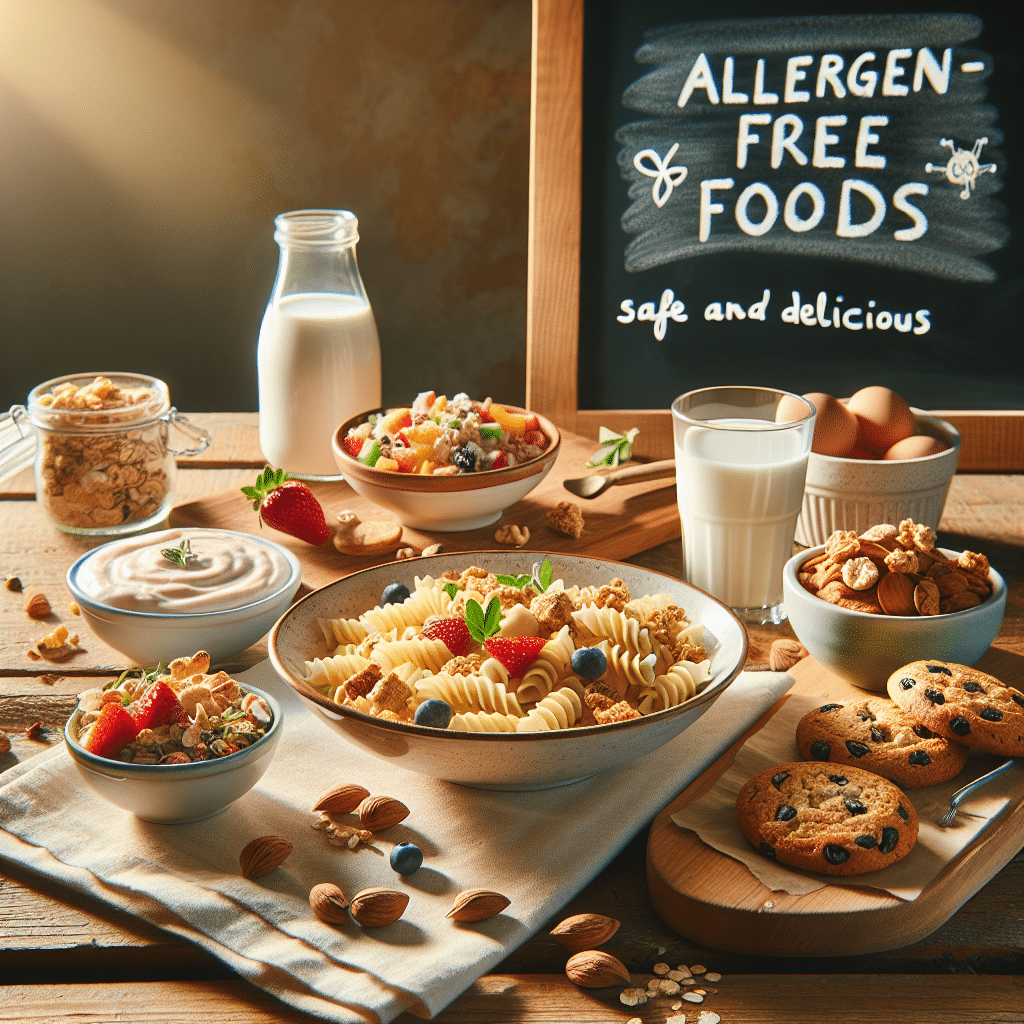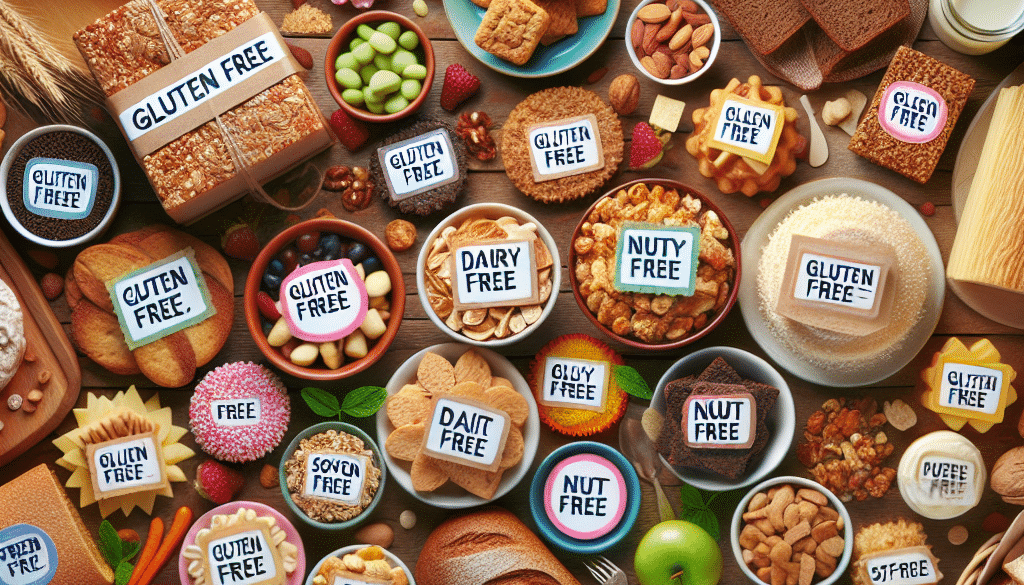Allergen-Free Foods: Safe and Delicious
-
Table of Contents
- Allergen-Free Foods: Ensuring Safety and Flavor for Everyone
- Understanding Food Allergies and Their Impact
- The Rise of Allergen-Free Foods
- Challenges in Creating Allergen-Free Foods
- Innovations in Allergen-Free Food Production
- Case Studies: Success Stories in Allergen-Free Foods
- Statistics: The Growing Allergen-Free Market
- Conclusion: The Future of Allergen-Free Foods
- ETprotein: Your Partner for Allergen-Free Protein Solutions
Allergen-Free Foods: Ensuring Safety and Flavor for Everyone

Food allergies are a growing concern worldwide, with millions of individuals affected by various food sensitivities and intolerances. The demand for allergen-free foods has never been higher, as consumers seek safe, nutritious, and delicious alternatives to traditional food products. This article delves into the world of allergen-free foods, exploring their importance, the challenges faced in their production, and the innovative solutions that are making these foods more accessible and enjoyable than ever before.
Understanding Food Allergies and Their Impact
Food allergies occur when the body’s immune system mistakenly identifies a harmless food protein as a threat, triggering an adverse reaction. These reactions can range from mild symptoms like hives or digestive discomfort to severe, life-threatening conditions such as anaphylaxis. The most common food allergens, often referred to as the “Big Eight,” include milk, eggs, peanuts, tree nuts, soy, wheat, fish, and shellfish.
According to the Food Allergy Research & Education (FARE), up to 32 million Americans have food allergies, including 5.6 million children under the age of 18. Globally, the prevalence of food allergies is rising, necessitating a greater focus on allergen-free food options.
The Rise of Allergen-Free Foods
Allergen-free foods are designed to exclude common allergens, providing safe alternatives for those with food allergies or intolerances. The growth of this market segment is driven by increased awareness, improved diagnostic methods, and the recognition of dietary needs by food manufacturers.
- Increased Awareness: Public understanding of food allergies has led to more demand for allergen-free products.
- Improved Diagnostics: Better testing methods have allowed for more accurate identification of food allergies.
- Food Industry Response: Food manufacturers are responding to consumer needs by developing a wider range of allergen-free products.
Challenges in Creating Allergen-Free Foods
Developing allergen-free foods that are both safe and palatable presents several challenges for food producers. These include ensuring cross-contamination prevention, maintaining nutritional value, and achieving desirable taste and texture.
- Cross-Contamination Prevention: Manufacturers must implement strict protocols to prevent allergens from coming into contact with allergen-free products.
- Nutritional Value: It’s crucial to ensure that allergen-free foods provide adequate nutrition and are not overly processed.
- Taste and Texture: Replicating the taste and texture of foods containing common allergens can be difficult but is essential for consumer satisfaction.
Innovations in Allergen-Free Food Production
Innovative food technologies and ingredients are paving the way for better allergen-free products. Plant-based proteins, for example, are being used as substitutes for dairy and eggs. Gluten-free grains like quinoa and rice are replacing wheat in baked goods and pastas. Food scientists are also exploring fermentation and enzymatic processes to break down potential allergens without compromising taste.
Case Studies: Success Stories in Allergen-Free Foods
Several companies have successfully navigated the allergen-free market, creating products that are both safe and enjoyable. Brands like Enjoy Life Foods specialize in snacks free from the Big Eight allergens, while Daiya Foods offers a range of dairy-free cheeses and yogurts made from coconut and other plant-based ingredients. These success stories highlight the potential for allergen-free foods to not only meet safety requirements but also to delight the palate.
Statistics: The Growing Allergen-Free Market
The allergen-free food market is experiencing significant growth. According to a report by MarketsandMarkets, the global allergen-free food market size is projected to reach USD 24.9 billion by 2025, growing at a CAGR of 9.1% from 2020 to 2025. This growth is indicative of the increasing demand for safe, allergen-free food options across the globe.
Conclusion: The Future of Allergen-Free Foods
The future of allergen-free foods is bright, with ongoing advancements in food science and technology. As the market continues to expand, consumers can expect a wider variety of safe and delicious allergen-free options. The key takeaways from this article are the importance of understanding food allergies, the challenges in creating allergen-free foods, and the innovative solutions that are making these foods more accessible and enjoyable.
ETprotein: Your Partner for Allergen-Free Protein Solutions
If you’re looking for high-quality allergen-free protein products, ETprotein is a company worth considering. Their extensive range of plant-based proteins, including organic rice protein, pea protein, and various seed proteins, are non-GMO and free from common allergens. ETprotein caters to a diverse range of industries, ensuring that their products meet the highest standards of safety and quality.
Whether you’re a manufacturer looking to create allergen-free foods or a consumer in search of safe protein options, ETprotein’s offerings provide the perfect solution. With a commitment to excellence and customer satisfaction, ETprotein stands out as a leader in the allergen-free protein market.
About ETprotein:
ETprotein, a reputable plant protein vegan protein Chinese factory manufacturer and supplier, is renowned for producing, stocking, exporting, and delivering the highest quality organic bulk vegan protein and plant proteins. They include Organic rice protein, clear rice protein, pea protein, clear pea protein, watermelon seed protein, pumpkin seed protein, sunflower seed protein, mung bean protein, peanut protein etc. Their offerings, characterized by a neutral taste, non-GMO, allergen-free attributes, cater to a diverse range of industries. They serve nutraceutical, pharmaceutical, cosmeceutical, veterinary, as well as food and beverage finished product distributors, traders, and manufacturers across Europe, USA, Canada, Australia, Thailand, Japan, Korea, Brazil, and Chile, among others.
ETprotein specialization includes exporting and delivering tailor-made protein powder and finished nutritional supplements. Their extensive product range covers sectors like Food and Beverage, Sports Nutrition, Weight Management, Dietary Supplements, Health and Wellness Products, and Infant Formula, ensuring comprehensive solutions to meet all your protein needs.
As a trusted company by leading global food and beverage brands and Fortune 500 companies, ETprotein reinforces China’s reputation in the global arena. For more information or to sample their products, please contact them and email sales(at)ETprotein.com today.












